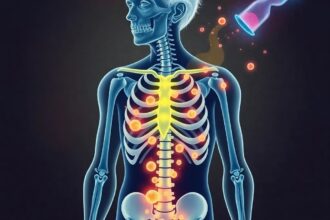Exploring the interconnected relationship between gut health, mental well-being, and skin conditions, with insights from recent research and expert opinions.
Recent studies reveal how gut microbiome imbalances can simultaneously impact mental health and skin conditions, creating a complex biological feedback loop.
The Gut-Brain-Skin Axis: Understanding the Connection
The concept of the gut-brain-skin axis represents one of the most exciting frontiers in medical research today. This tri-directional communication system explains how our digestive system, nervous system, and largest organ – the skin – constantly interact through complex biochemical pathways.
The Historical Foundation
While the gut-brain-skin axis might seem like a modern discovery, its roots trace back to early 20th century dermatologists. As Dr. Whitney Bowe, a board-certified dermatologist and author of The Beauty of Dirty Skin
, notes: In the 1930s, dermatologists John Stokes and Donald Pillsbury first proposed that emotional states could alter gut flora and subsequently influence skin health. Their work was ahead of its time, but we’re now proving many of their theories correct with modern science.
The Microbiome’s Role
At the heart of this axis lies the microbiome – the trillions of microorganisms living in and on our bodies. A 2020 study published in Nature Microbiology found that individuals with depression showed significantly different gut microbiota compositions compared to healthy controls. These same microbial patterns have been observed in patients with inflammatory skin conditions.
Dr. Emeran Mayer, a gastroenterologist and author of The Mind-Gut Connection
, explains: The vagus nerve serves as a superhighway between the gut and brain, while inflammatory cytokines and microbial metabolites travel through the bloodstream to affect distant organs, including the skin.
Clinical Evidence and Mechanisms
From Gut to Skin
Research demonstrates several mechanisms by which gut dysbiosis affects skin health:
- Increased intestinal permeability (leaky gut) allows bacterial endotoxins into circulation, triggering systemic inflammation
- Microbial metabolites influence sebum production and skin cell differentiation
- Gut bacteria regulate the availability of nutrients critical for skin health
A 2021 meta-analysis in the Journal of Investigative Dermatology found that probiotic supplementation reduced acne severity by 32% compared to placebo. Specific strains like Lactobacillus rhamnosus GG showed particular promise for both acne and eczema.
The Mental Health Connection
The same inflammatory pathways that affect the skin also influence brain function. A landmark 2019 study in Nature Mental Health followed 1,000 participants for five years, finding that those with gut microbiome diversity had a 42% lower risk of developing depression.
Dr. Jane Foster, a neuroscientist at McMaster University, states: We’ve identified specific gut bacteria that produce neurotransmitters like GABA and serotonin. When these microbial communities are disrupted, it can directly affect mood and cognition.
Practical Applications
Dietary Interventions
Emerging research suggests several dietary strategies to support the gut-brain-skin axis:
- Polyphenol-rich foods (berries, dark chocolate) promote beneficial bacteria
- Fermented foods introduce diverse probiotic strains
- Omega-3 fatty acids reduce systemic inflammation
A 2022 clinical trial published in Dermatology and Therapy found that participants following a Mediterranean diet while taking a probiotic supplement showed significant improvements in both psoriasis symptoms and anxiety scores compared to controls.
Lifestyle Factors
Beyond diet, other lifestyle factors influence this axis:
- Stress management techniques like meditation help maintain gut barrier function
- Regular exercise increases microbial diversity
- Quality sleep allows for microbiome restoration
As integrative dermatologist Dr. Raja Sivamani notes: We’re moving toward an era where dermatologists will routinely assess gut health and mental well-being as part of comprehensive skin treatment plans.
Future Directions
The field of psychodermatology continues to evolve rapidly. Current research focuses on:
- Developing targeted postbiotic therapies
- Personalized microbiome interventions
- Understanding epigenetic influences on the axis
As we unravel these complex connections, the gut-brain-skin axis promises to revolutionize how we approach both dermatological and mental health conditions, offering more holistic treatment strategies that address root causes rather than just symptoms.




